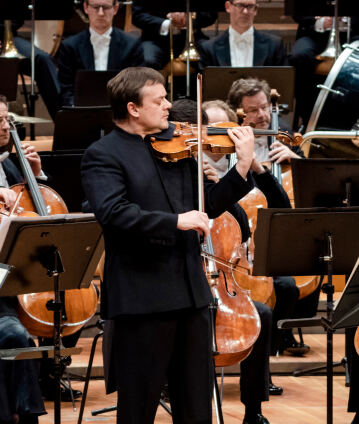A “Czech Evening” with Jakub Hrůša and Frank Peter Zimmermann

Frank Peter Zimmermann is one of the foremost violinists of our time and a great admirer of Bohuslav Martinů’s rarely played Violin Concerto No. 1, a both sonorous and expressive work, which he presents in this concert. Jakub Hrůša, chief conductor of the Bamberg Symphony and a guest of the Berliner Philharmoniker for the first time, also presents Dvořák’s symphonic poem The Golden Spinning Wheel and Janáček’s Rhapsody Taras Bulba.
Frank Peter Zimmermann is constantly on the lookout for less familiar works that are not part of the standard repertoire: “I have played and recorded the standard works so many times that I want to make audiences aware of other important pieces.” This concert features Bohuslav Martinů’s Violin Concerto No. 1, which is “no less magnificent” than its outstanding contemporary violin concertos by Stravinsky, Bartók, Berg, Schoenberg and Britten but which is nevertheless still not as widely known” (Zimmermann).
Martinů, who was born in Polička near the Bohemian-Moravian border in 1890 and who himself was a violinist in the Czech Philharmonic when he was young, wrote this piece in 1932/1933 for the violin virtuoso Samuel Dushkin, for whom Stravinsky had recently composed his violin concerto. The technically extremely demanding work, which includes elements such as percussion effects in the middle section, shows how much the Czech composer had been infected with the “Neoclassical virus” (George Antheil) which was rampant in Paris in the “Roaring Twenties”. Nevertheless, original details such as the muted string trills with flutter-tonguing sounds from the flute in the large-scale first movement and the intricate syncopation in the sparkling coda of the finale give the work an individual tone.
Jakub Hrůša, chief conductor of the Bamberger Symphoniker and a guest of the Berliner Philharmoniker for the first time, opens the concert with the tone poem The Golden Spinning Wheel by his fellow countryman, Antonín Dvořák. The multi-faceted music, based on a legend by Karel Jaromír Erben, depicts the Czech version of the Cinderella story. The concert closes with Leoš Janáček’s dramatic and brilliantly orchestrated orchestral rhapsody Taras Bulba, based on the novella of the same name by Nikolai Gogol, which tells the tragedy of the old Zaporozhian Cossack Taras Bulba and his two sons, Andrij and Ostap, in an uprising against Poland. The poetic original determines the work’s form and movements: in the first part, brooding music evokes the ambiguous feelings of the Cossack captain who kills his own son because he has betrayed him for the love for a Polish noblewoman. In the second movement, Taras Bulba witnesses the execution of his second son Ostap by the Poles, and in the third part, he is himself condemned to death. Nevertheless, the work ends with a grand apotheosis, as the end of Polish occupation looms.
© 2018 Berlin Phil Media GmbH
Related interviews
Artists
Our recommendations
- Brahms’s Violin Concerto with Frank Peter Zimmermann and Bernard Haitink
- Dima Slobodeniouk and Frank Peter Zimmermann
- Mariss Jansons and Frank Peter Zimmermann
- Daniel Harding, Frank Peter Zimmermann and Christian Gerhaher
- Daniel Harding and Frank Peter Zimmermann
- Mariss Jansons conducts Dvořák’s Symphony “From the New World”